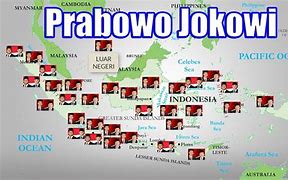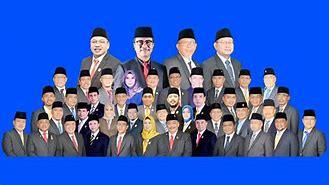
Perolehan Suara Jokowi Vs Prabowo 2014
SK KPU 013 Tahun 2014 TTG Penetapan Perolehan Suara Dan Perolehan Kursi-Okbgt
Pilpres 2014 Pilih Prabowo, Kini Raffi Ahmad Dukung Jokowi, Ini Sederet Tanda-tandanya
TRIBUN-MEDAN.com-Artis dan presenter kondang Raffi Ahmad belakangan namanya ramai dibicarakan di media sosial terkait Pilpres 2019.
Terlebih saat munculnya gambar dirinya berswafoto dan melakukan vlog bersama Jokowi.
Awal pertemuan Raffi Ahmad dengan presiden Jokowi terjadi pada saat pembukaan Asian Para Games 2018, event yang dilaksanakan pada Oktober lalu.
Kala itu saat bertemu Jokowi, Raffi Ahmad ditunjuk sebagai MC pada acara pembukaan Asian Para Games 2018.
"Wah terima kasih, sukses untuk acara Asian Para Gamesnya, sukses buat semuanya, wah senang banget pokoknya," kata Raffi Ahmad saat bertemu Jokowi, Sabtu (6/10/2018).
Kala itu, Raffi Ahmad ditunjuk sebagai MC di gelaran acara Asian Para Games 2018.
Adapun kala itu, Raffi Ahmad dianggap sukses dan mendapatkan pujian dari beberapa pihak karena menjadi MC pembuka di Opening Ceremony Asian Para Games 2018.
Waktu pun berlalu, akhirnya Raffi Ahmad pun mengunggah foto dan video terbarunya saat sedang bersama presiden Jokowi.
Adapun fotonya saat bersama Jokowi, dipamerkan Raffi Ahmad di akun instagram miliknya.
"Kira kira ngobrolin apa ya???," Tulis akun Instagram Raffi Ahmad dengan nama @raffinagita1717.
"Aku habis ngevlog sama pak Jokowi, harus ditunggu, mantap, di Rans Entertainment," kata Raffi Ahmad, Jumat (21/12/2018).
Pertemuan tak hanya berhenti dengan Jokowi saja, ternyata baru-baru ini pun Raffi Ahmad bertemu dengan cawapres pendamping Joko Widodo di Pilpres 2019, yakni KH Maruf Amin.
Momen pertemuan Raffi Ahmad dan Maruf Amin itu terjadi saat acara pernikahan anak Ketua MUI Nonaktif itu.
"Habis tanya-tanya sama Pak Jokowi, sekarang Raffi punya kesempatan di hari yang berbahagia, di lamaran putrinya Abah Maruf Amin," ujar Raffi Ahmad dalam video yang diunggah saluran Youtube Official iNews, Selasa (1/1/2018).
"Abah boleh gak saya nanya-nanya Abah?" Tanya Raffi Ahmad sambil memegang ponsel yang merekam dirinya dengan Ma'ruf Amin.
"Boleh, boleh," ucap Maruf Amin santai.
Adapun Raffi Ahmad menanyakan pada Maruf Amin soal kesukaannya pada sepak bola.
"Ini kan Abah pegang bola. Abah suka sepak bola?," tanya Raffi Ahmad.
kepada Raffi Ahmad, Maruf Amin mengakui bahwa saat mudanya ia menyukai sepakbola, namun semakin tua dirinya hanya bisa menonton pertandingan sepak bola saja.
"Ya waktu saya masih muda suka sepak bola. Sekarang ya nonton bola, analisa bola," jawab Maruf Amin.
Lalu Raffi Ahmad pun menanyakan negara mana dan siapa pemain sepak bola yang difavoritkan oleh Maruf Amin.
"Kalau negara yang paling Abah favoritkan negara apa dan siapa pemainnya, Abah?," tanya Raffi Ahmad lagi kepada Maruf Amin.
"Banyaknya kompetisinya itu di Inggris," jawab Maruf Amin.
"Wah Liga Inggris, siapa pemain yang paling Abah favoritkan?," tanya Raffi Ahmad.
"Wah kalau dulu kan David Beckham," jawab Maruf.
Mendengar jawaban Maruf Amin, Raffi Ahmad pun berceletuk jika calon mantu Maruf seperti David Beckham.
"Wah David Beckham. Ini calon mantunya kaya David Beckham ini," canda Raffi Ahmad lalu disambut tawa orang-orang di sekitarnya.
Pengalaman Ngevlog bareng Presiden
Pada saat menjadi pembicara di acara Gebyar Milenial di Bandung,Raffi Ahmad pun menceritakan pengalaman terbarunya saat bersama pasangan calon presiden dan wakil presiden nomor urut satu, Jokowi dan Ma'ruf Amin di kediaman mereka.
"Saya sempat membuat vlog mereka berdua, responnya bagus. Saya menganggap mereka seperti orangtua sendiri," ujar Raffi Ahmad, saat menghadiri acara Gebyar Milenial, di Jalan Sunda, Kota Bandung, Minggu (10/3/2019).
Adapun Raffi Ahmad mengatakan, saat diundang oleh Jokowi ke Istana Bogor bersama dengan putranya, Rafathar Malik Ahmad, istrinya Nagita Slavina, dan pengasuh Rafathar, tak hanya membuat vlog, tetapi sempat berada satu kendaraan bersama Presiden Jokowi dan keluarganya.
"Kebetulan diundang ke istana waktu itu. Bikin vlog dan nyupiri pak Jokowi. Abah Maruf juga pernah mengundang ke rumah bikin vlog. Membuat vlog ada maknanya tentang keluarga yang hebat," kata Raffi Ahmad.
Selain itu, Raffi Ahmad menuturkan setelah berbincang cukup lama dan beberapa kali bertemu dengan dua tokoh tersebut. Ia menilai keduanya merupakan orang yang baik.
"Apalagi pak Jokowi presiden tapi enggak pernah memposisikan kayak presiden, maksudnya merakyat. Abah kiai Maruf Amin juga sama. Semoga mereka bisa membawa Indonesia yang lebih baik lagi," ujarnya.
Belum lama ini beredar video Raffi Ahmad tengah diwawancarai oleh dua orang relawan Jokowi yang mengatasnamakan kelompoknya sebagai Remaja alias Relawan Milenial Jokowi Ma'ruf.
Adapun penanya yang juga adalah perwakilan dari kelompok Remaja menanyakan pada Raffi Ahmad tentang pandangannya terhadap Pilpres 2019.
"Ya kalau untuk Pilpres 2019 sih saya doakan, yang paling penting nih untuk semua milenial, kita bisa jaga keamanan, jaga privasi juga, jadi apapun pilihan kita itu memang sudah jadi pilihan kita ya, yang paling penting saya ingin Indonesia tuh aman, dan enggak ada lagi kerusuhan-kerusuhan itu, dan yang paling penting lagi semuanya cinta damai," kata Raffi Ahmad pada tayangan video yang diunggah akun youtube @Jendela Kabar, Rabu (26/12/2018).
Pada ujung tayangan wawancara Raffi Ahmad dengan kelompok milenial Remaja, Raffi Ahmad pun mengiyakan saat diminta mengikuti Jargon kelompok Remaja itu.
Dari kedekatan Raffi Ahmad dengan Jokowi tersebut, muncul kabar bahwa Raffi Ahmad kini berbalik mendukung Petahana untuk memenangi Pilpres 2019.
Hal itu berdasarkan dugaan para warganet.
Bukan tanpa sebab warganet menyebut Raffi Ahmad bakal mendukung Jokowi di Pilpres 2019, meskipun sebelumnya sudah jadi rahasia umum Raffi Ahmad ketika Pilpres 2014 mendukung Prabowo Subianto.
Adapun Raffi Ahmad secara terang-terangan di Pilpres 2014, menyatakan mendukung Prabowo Subianto dan Hatta Rajasa untuk memenangi Pilpres 2014.
Berikut cuplikan pendapat para artis, seniman, dan profesi lainnya tentang Prabowo Subianto, termasuk komentar Raffi Ahmad pada Pilpres 2014 :
Artikel ini telah tayang di tribunjabar.id dengan judul Sederet Tanda-tanda Raffi Ahmad Bakal Coblos Jokowi di Pilpres 2019, Tak Akan Lagi Dukung Prabowo
0%0% menganggap dokumen ini bermanfaat, Tandai dokumen ini sebagai bermanfaat
0%0% menganggap dokumen ini tidak bermanfaat, Tandai dokumen ini sebagai tidak bermanfaat
SCROLL TO CONTINUE WITH CONTENT
Istilah 'kadrun' berkembang setelah munculnya istilah 'kampret'. Tendensinya sama saja, yakni digunakan untuk mengolok-olok kubu politik yang berseberangan.
Istilah kadrun digunakan oleh kubu pendukung Presiden Jokowi untuk menyebut kelompok yang berseberangan dengan mereka. Salah satu pendukung Jokowi yang aktif di media sosial, yakni Ade Armando, pernah menjelaskan soal istilah ini saat ada yang keberatan dengan istilah kadrun yang dilontarkan Ade.
"'Kadrun' itu kan bahasa yang kita pakai sekarang itu untuk menjelaskan orang-orang yang berpikiran sempit, terutama yang dipengaruhi oleh gerakan ekstremisme, fundamentalisme dari Timur Tengah, makanya istilahnya 'kadal gurun' kan," kata Ade saat dihubungi wartawan, 10 Juni 2020.
Analis media sosial Drone Emprit and Kernels Indonesia, Ismail Fahmi, sempat menelusuri asal mula penggunaan istilah 'kadrun' di media sosial. Dia menuangkan penjelasannya di akun Twitter-nya pada 13 Agustus 2020, dan mempersilakan detikcom untuk mengutip penjelasannya saat dihubungi pada Kamis (17/12/2020).
Temuan Ismail Fahmi, cuitan di Twitter mengandung kata 'kadal gurun' muncul pada 22 Februari dan 12 Maret 2019. Selanjutnya, pada 15 Mei 2019, pukul 09.25 WIB, istilah 'kadal gurun' mulai digunakan untuk menstigma pihak yang dicap radikal.
Baru pada 13 September 2019, istilah 'kadrun' menjadi tren. Penggunaannya terpantau mengalahkan tren volume penyebutan 'cebong' dan 'kampret'. Maka Ismail Fahmi menyimpulkan, tren istilah kadrun muncul tahun 2019.
Terpantau pada saat itu, lima besar influencers pengguna istilah 'kadrun' adalah akun @Dennysiregar7, akun @ChusnulChotimah, akun @Candraasmara85, akun @mochamadarip, dan akun @AnakKolong.
Gatot ingin istilah itu dihentikan
Gatot Nurmantyo menyebut istilah binatang itu dihentikan. Soalnya, itu melecehkan Tuhan Yang Maha Esa.
Pernyataan itu disampaikan Gatot dalam video yang dibagikan akun Instagram-nya @nurmantyo_gatot yang bercentang biru seperti dilihat detikcom, Kamis (17/12/2020). Gatot juga menyertakan caption 'jangan merendahkan bangsaku' di unggahannya itu.
"Dalam kesempatan ini juga saya mengimbau, secara tidak sadar ataupun sadar, sengaja ataupun tidak sengaja, kita anak bangsa ini sudah merendahkan bahkan melecehkan kepada Tuhan Yang Maha Esa dengan mempunyai sebutan masing-masing ada yang menyebutkan kadrun, ada yang menyebutkan kampret, itu kan nama binatang, padahal itu ciptaan Tuhan, manusia kita semua," kata Gatot dalam video.
MEDAN, Waspada.co.id – DPRD Medan, Senin (4/11) kemarin, telah merampungkan komposisi personalia fraksi-fraksi. Dari 50 anggota DPRD Medan periode 2024-2029, ditetapkan 9 fraksi yang bakal bertugas selama lima tahun ke depan.
Adapun ke 9 fraksi tersebut yakni Fraksi PDIP, Fraksi PKS, Fraksi Gerindra, Fraksi Golkar, Fraksi PSI, Fraksi Nasdem, Fraksi Demokrat, Fraksi Amanat Indonesia (gabungan PAN dan Perindo), dan Fraksi Hanura-PKB (gabungan Partai Hanura dan PKB).
Dirangkum dari berbagai sumber, Rabu (6/11), berikut perolehan suara 50 anggota DPRD Medan periode 2024-2029 dan jumlah perolehan kursi partai peserta Pemilu 14 Pebruari 2024 lalu, yakni:
– Partai Kebangkitan Bangsa (PKB) = 2 kursi. 1. Romauli Silalahi = 6.404 suara (Dapil II) 2. Lailatul Badri = 3.817 suara (Dapil III)
– Partai Gerindra = 6 kursi. 1. Dame Duma Sari Hutagalung = 7.611 (Dapil I) 2. Tia Ayu Anggraini = 6.329 suara (Dapil II) 3. Zulkarnaen = 12.880 suara (Dapil III) 4. Andreas Pandapotan Purba = 7.632 suara (Dapil III) 5. Fauzi = 5.414 suara (Dapil IV) 6. Salomo T Pardede = 5.359 suara (Dapil V)
– Partai Demokrasi Indonesia Perjuangan = 9 kursi. 1. Roby Barus = 10.354 suara (Dapil I) 2. Lily = 7.239 suara (Dapil I) 3. Margaret MS = 13.403 suara, (Dapil II) 4. Wong Chun Sen = 12.408 suara (Dapil III) 5. Paul Mei Simanjuntak = 9.087 suara (Dapil III) 6. Agus Setiawan = 9.487 suara (Dapil IV) 7. David Roni G Sinaga = 7.281 suara (Dapil IV) 8. Jusup Ginting Suka = 8.395 suara (Dapil V) 9. Johannes Haratua Hutagalung = 7.596 suara (Dapil V)
– Partai Golkar = 6 kursi. 1. Reza Pahlevi Lubis = 11.012 suara (Dapil I) 2. Hadi Suhendra = 10.000 suara (Dapil II) 3. Modesta Marpaung = 9.058 suara (Dapil III) 4. Elbarino Shah = 13.649 suara (Dapil IV) 5. Dimas Sofani Lubis (11.163 suara (Dapil V) 6. Rommy Van Boy = 7.875 suara (Dapil V)
– NasDem = 5 kursi. 1. Antonius D Tumanggor = 5.974 suara (Dapil I) 2. Saiful Bahri = 10.084 suara, Dapil II) 3. Faisal Arbie = 5 260 suara (Dapil III) 4. Afif Abdilah = 13.082 suara (Dapil IV) 5. M Afri Rizki Lubis = 8.512 suara (Dapil V)
– PKS = 8 kursi. 1. Rajuddin Sagala = 17.582 suara (Dapil I) 2. Zulham Effendi = 5.244 suara (Dapil II) 3. Doli Indra Rangkuti = 5.786 suara (Dapil III) 4. Datuk Iskandar Muda = 3.725 suara (Dapil III) 5. Ade Taufiq = 9.905 suara (Dapil IV) 6. Sri Rezeki = 8.168 suara (Dapil IV) 7. Kasman M Lubis = 9.132 suara (Dapil V) 8. Syaiful Ramadhan = 5.114 suara (Dapil V)
– Hanura = 2 kursi. 1. Janses Simbolon = 10.155 suara (Dapil II) 2. Eko Afrianta Sitepu = 10.109 suara (Dapil V)
– PAN = 3 kursi. 1. HT Bahrumsyah = 12.604 suara (Dapil II) 2. Edwin Sugesti Nasution = 7.449 suara (Dapil III) 3. Edi Sahputra = 8.084 suara (Dapil IV)
– Demokrat = 4 kursi. 1. Muslim = 5.607 suara (Dapil II) 2. Ahmad Affandi Harahap = 3.946 suara (Dapil III) 3. Dodi Robert Simangunsong =3.583 suara (Dapil IV) 4. Iswanda Ramli = 5.496 suara (Dapil V)
– PSI = 4 kursi. 1. Renville P Napitupulu = 4.589 suara (Dapil I) 2. Reinhart Jeremy Aninditha = 3.862 suara (Dapil III) 4. Godfried Effendi Lubis = 3.864 suara (Dapil IV) 5. Henry Jhon Hutagalung = 1.813 suara (Dapil V)
– Perindo = 1 kursi. 1. Binsar Simarmata = 4.216 suara (Dapil V)
Dari semua partai tersebut, diketahui partai pemenang di Pemilu untuk Kota Medan periode 2024-2029 yakni:
1. PDI P = 9 kursi 2. PKS = 8 kursi 3 Gerindra = 6 Kursi 4. Golkar = 6 Kursi 5. Nasdem = 5 Kursi 6. PSI = 4 Kursi 7. Demokrat = 4 Kursi 8. PAN = 3 Kursi 9. PKB = 2 Kursi 10. Hanura = 2 Kursi 11. Perindo = 1 Kursi
Sejumlah peserta kirab membawa bendera partai politik saat acara Kirab Pemilu 2024 di Kabupaten Bogor Jawa Barat, Senin 13 November 2023. Kirab yang digelar oleh Komisi Pemilihan Umum (KPU) Kabupaten Bogor tersebut sebagai sarana sosialisasi Pemilu damai dan edukasi serta mengajak masyarakat berpartisipasi dalam kontestasi demokrasi Pemilu 2024. ANTARA FOTO/Yulius Satria Wijaya
Berbagai lembaga survei telah merilis hasil akhir hitung cepat atau quick count Pemilu 2024. Selain hitung cepat hasil pilpres, lembaga-lembaga survei turut merilis perolehan suara partai politik peserta pemilu legislatif (pileg).
Baca berita dengan sedikit iklan, klik di sini
Hasil hitung cepat berbagai lembaga survei kompak menempatkan Partai Demokrasi Indonesia Perjuangan (PDIP) sebagai partai politik dengan perolehan suara legislatif terbanyak pada Pemilu 2024, dengan persentase hasil suara yang beragam. Namun jika dibandingkan dengan hasil resmi Pileg 2019, suara PDIP turun sekitar 2-3 persen.
Apabila hasil perhitungan resmi Komisi Pemilihan Umum (KPU) nantinya menunjukkan hasil serupa, maka PDIP tercatat sebagai partai pemenang pemilu terbanyak di era Reformasi, yakni sebanyak empat kali. Sebelumnya, PDIP memenangi Pemilu 1999, 2014, dan 2019.
Sedangkan Partai Golkar menempati peringkat kedua hasil hitung cepat berbagai lembaga survei, disusul Gerindra. Berkaca pada hasil tersebut, maka PDIP, Golkar, dan Gerindra tidak pernah absen dari tiga besar partai dengan perolehan suara terbanyak dalam tiga edisi pemilu terakhir—2014, 2019, dan 2024. Bahkan, PDIP, dan Golkar selalu menjadi salah dua dari tiga partai teratas di pemilu pada era Reformasi.
At the end of August, nationwide protests rocked Indonesia, with demonstrators in Jakarta trying to break down the gates of parliament. The spark was a plan by lawmakers to circumvent Constitutional Court rulings about Indonesia’s regional elections in November that would disadvantage the political alliance of current President Joko Widodo, known as Jokowi, and Defense Minister Prabowo Subianto, who will succeed him on Oct. 20.
Faced with the angry protests, the lawmakers backed down in a rare defeat for the partnership that now dominates Indonesian politics. With remarkable chutzpah, both Jokowi and Prabowo quickly distanced themselves from the bills proposed by their supporters in parliament.
At the end of August, nationwide protests rocked Indonesia, with demonstrators in Jakarta trying to break down the gates of parliament. The spark was a plan by lawmakers to circumvent Constitutional Court rulings about Indonesia’s regional elections in November that would disadvantage the political alliance of current President Joko Widodo, known as Jokowi, and Defense Minister Prabowo Subianto, who will succeed him on Oct. 20.
Faced with the angry protests, the lawmakers backed down in a rare defeat for the partnership that now dominates Indonesian politics. With remarkable chutzpah, both Jokowi and Prabowo quickly distanced themselves from the bills proposed by their supporters in parliament.
“Today we saw an extraordinary democratic process,” Hasan Nasbi, the head of communications for Jokowi, said on Aug. 22, the day that protesters attempted to storm parliament, adding that the scenario was just an example of “our greatness as a nation.” Prabowo took the opportunity to denounce unnamed politicians with an “endless thirst for power” who “seek to pursue interests other than those of the people.”
This year, facing a term limit, Jokowi tacitly backed Prabowo’s presidential bid in Indonesia’s February election. Some state institutions have seemed to help Prabowo, who has pledged to continue Jokowi’s legacy. Their powerful alliance has pushed Indonesia’s democratic system to its limits—but the protests show that opposition remains, even if under threat. The Constitutional Court rulings still stand in their way as regional elections approach, and Prabowo may face similar pushback when he takes office.
The surprise rulings by the Constitutional Court will reshape the regional elections in November. The first decision lowered the nomination threshold for candidates. Until now, regional candidates needed backing from political parties that collectively represent at least 20 percent of seats in regional legislatures or 25 percent of all voters. With eight major parties aligned behind Prabowo and Jokowi, there was clear coordination to back single candidates in key governors’ races, which would have let them run unopposed.
Candidates critical of the government faced a lockout. But the ruling should now enable candidates to run from Jokowi’s former party, the Indonesian Democratic Party of Struggle (PDI-P)—which increasingly opposes the president since he backed Prabowo.
The Constitutional Court also struck down a May Supreme Court ruling that found that regional candidates needed to meet minimum age requirements only at the time of their inauguration, not when they register their candidacies—as was previous practice. Critics found the Supreme Court’s decision suspect, not least because the only candidate affected in the regional elections was Jokowi’s youngest son, Kaesang Pangarep, who was preparing to run for deputy governor of Central Java.
Last year, another Constitutional Court ruling allowed Jokowi’s eldest son, Gibran Rakabuming Raka, to run as Prabowo’s vice president despite not meeting the age limit of 40. The case was presided over by then-Chief Justice Anwar Usman—who happens to be Jokowi’s brother-in-law; he was later forced to step down for ethics violations in presiding over the case.
Faced with this double blow, pro-government parties formed their plan to circumvent the rulings in parliament. On Aug. 21, key legislators met with Minister of Law and Human Rights Supratman Andi Agtas, a member of Prabowo’s party. They emerged with a proposal to revise the regional election law’s provisions on candidate eligibility and nominations.
But while public reaction to previous controversies—such as the ruling that allowed Gibran to run—was muted, there was swift popular outcry this time around. “At the time of the Constitutional Court’s Gibran decision, the people were perhaps not yet aware what was occurring behind the scenes and the meddling of President Joko Widodo,” said Agung Pradita, a student who helped lead the protests. “The people are now becoming aware that the state of democracy in Indonesia today is not good.”
On Aug. 22, protesters launched major demonstrations in more than a dozen Indonesian cities. As usual, students and workers’ groups took the lead among the crowds, but many experienced activists said that the protests attracted more people not usually inclined toward activism. They credited much of this to social media, where influencers and others with popular accounts promoted protests with an image designed to look like a disaster warning.
Many protesters focused on Jokowi, accusing him of plotting to build a political dynasty and drawing comparisons to the nepotism of the military dictator Suharto, who led Indonesia as president for 30 years. Other activists took up broader themes: “The reason I fought hard to safeguard the Constitutional Court decisions is because, in my opinion, if we lost that decision, we’ve lost our democracy and we’ve lost our rule of law,” Titi Anggraini, a constitutional lawyer, said.
Thomas Lembong, a former trade minister under Jokowi who is now a critic, was one of the few prominent political figures to publicly side with the protesters, giving a speech at a demonstration in Jakarta. “Democratic values … are deeply embedded in our society some 26 years after our transition to democracy, and what we’re witnessing is our people reacting strongly to efforts by certain political elites to dismantle the institutions of democracy,” Lembong told Foreign Policy.
The upcoming regional elections now look more competitive, with some caveats. Few races look set to have just a single candidate, although a number of races include only candidates supported by parties within Prabowo’s coalition. Still, limits on Prabowo’s ability to corral parties that nominally support him may serve as a check on his power. The PDI-P is the one party currently providing opposition to Prabowo and Jokowi, but its plans to back former governor of Jakarta and presidential candidate Anies Baswedan to run in either Jakarta or West Java foundered.
Lembong said he is hopeful that the Prabowo-led government might reverse course from Jokowi once it takes office next month. “With a fresh electoral mandate, and inheriting all the levers of power as the continuation of the ruling coalition, the incoming Prabowo administration has every opportunity to rehabilitate our democratic institutions,” he said.
However, if the executive has chipped away at limits on its power under Jokowi, there are reasons to believe that this trend could continue under Prabowo. The onetime son-in-law of Suharto, Prabowo was implicated in the kidnapping and disappearance of democracy activists in 1998; he has previously expressed dissatisfaction with how democracy functions in Indonesia and suggested that regional elections should be abolished.
“For a long time, there’s been the Indonesian struggle for democracy,” said Kevin O’Rourke, founder of the political risk consultancy Reformasi Information Services. “Now it seems more the Indonesian toggle for democracy: toggle off one day, toggle on the next.”
The Constitutional Court is already under pressure. Anwar, the former chief justice, is pursuing a court case to be reinstated to the role. Pro-government lawmakers have proposed bills that would weaken the court, in part by changing term limits for judges that would remove some of the judges who voted against the Gibran ruling last year.
The military, a mainstay of the political system under Suharto, may also stage a modest comeback when Prabowo takes office. Senior politicians expected to serve in Prabowo’s government have privately indicated that he is keen to see the military play a role. Political analysts have expressed alarm over proposed legal changes that would help the military expand its influence in politics. The revisions to laws governing the military would allow active-duty officers to serve in a wider range of bureaucratic posts, and the military has also started lobbying to regain its right to engage in business activities.
Meanwhile, the potential for active political opposition in Indonesia has narrowed. Prabowo has recently suggested that such opposition was a Western cultural import and that Indonesia should cultivate a consensual political culture. He has already secured the support of seven of the eight parties that will sit in the next parliament. Leaders who don’t fall in line face being forced out. Airlangga Hartarto, the head of Golkar, Indonesia’s second-largest party in parliament, suddenly resigned on Aug. 11 without a clear explanation. He was reluctant to accept plans for all parties backing Prabowo to throw their weight behind the same candidates in regional races.
The new head of Golkar, Minister of Energy and Mineral Resources Bahlil Lahadalia, is seen as a close ally of Jokowi. In his speech accepting party leadership, he emphasized that Golkar would support the Prabowo government, adding cryptically: “We have to do better, because we’ll be doomed by this ‘Javanese king’ if we play around. I’m telling you, don’t try to play around with this thing. It’s terrifying.” Politicians and analysts interpreted the comment as a reference to Jokowi.
The only party that seems to be in the opposition now is the PDI-P, Jokowi’s former home; it pushed back against the proposed plans to disregard the Constitutional Court rulings and has at times raised the alarm about democratic erosion. However, Prabowo has signaled interest in working with the PDI-P, and while party leader Megawati Sukarnoputri may feel betrayed by Jokowi, she has worked with Prabowo in the past. (He was her running mate for the presidency in 2009.) Sukarnoputri’s daughter and heir apparent, parliamentary speaker Puan Maharani, has seemed particularly open to taking a cooperative approach.
How long Prabowo’s current cozy arrangement will work for him remains unclear. The political gossip in Jakarta today often revolves around when Jokowi and Prabowo’s relationship will break down. Until then, the room for opposition within the political system will likely remain limited—but if the opposition cannot find an outlet within established structures, it will continue to express itself outside the system as it did last month.



